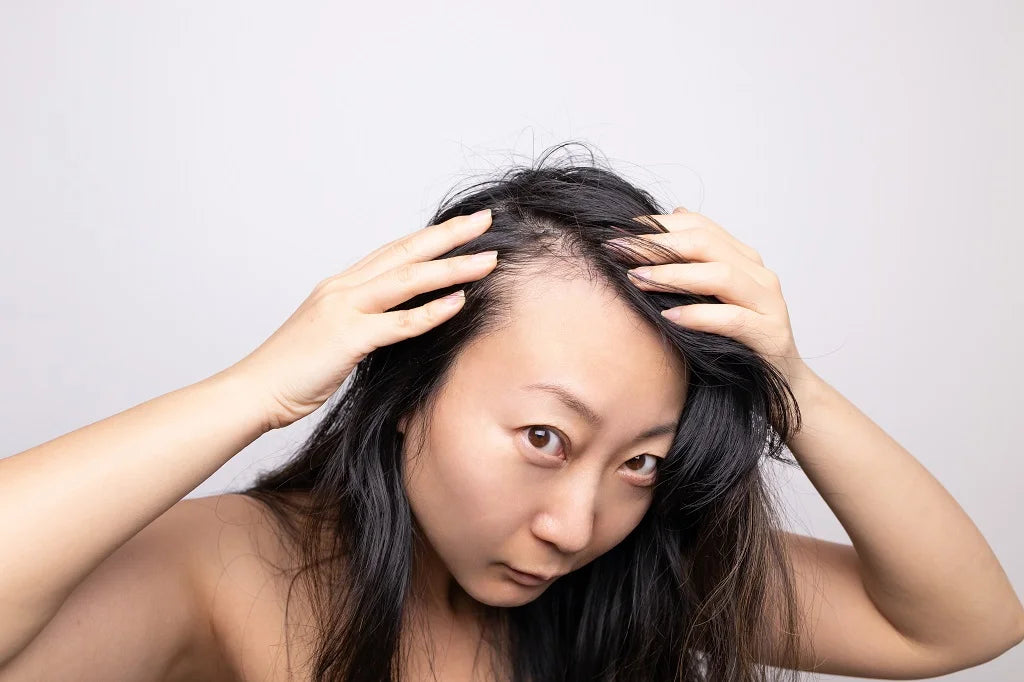
Are You Getting Pimples On Your Scalp? Here's What You Need To Do

Dr. Shireen Singh, MBBS.
Written by Our Editorial Team
Listen to the blog
Nothing can replace the joy of reading, right? Read the blog here.
Getting pimples or acne on your scalp can be annoying. Pimples on your scalp can be as uncomfortable as those on any other part of your skin. We all talk about pimples on the face or body zits, but rarely anyone talks about scalp acne. Experts say pimples on the scalp may not be very common, but they are not rare either. Why do we get pimples on the scalp? Dermatologists say there can be numerous reasons for scalp acne, from poor hygiene to hormonal changes in the body. Read on to know more about the causes of pimples on the scalp and how to get rid of acne on the scalp.
Also Read : Scalp Care Is The New Skincare : Here's Some Inspo To take Scalp Care Seriously!
Why Do You Get Them?

There can be a host of reasons for getting pimples on the scalp, with clogged hair follicles being the primary one. When dead skin cells, dirt, and grime accumulate on the skin, it clogs the pores of the scalp, resulting in scalp acne. You may also contact them due to hormones, products or oil buildup of the scalp, bacterial infection or scalp inflammation, characterized by an oily scalp. The development of cysts on the scalp and dry scalp conditions such as dandruff and seborrheic dermatitis can also lead to pimples on the scalp. Seborrheic dermatitis and dandruff can lead to a dry, itchy and flaky scalp which can lead to the appearance of bumpy structures on the scalp that are tender to the touch. Many a time, your haircare product can also be a contributing factor to scalp acne. The heavy oils in haircare products can block the pores of your scalp, resulting in pimples on the scalp or scalp acne.
Apart from these, poor haircare habits, traveling, lack of sleep, diet, stress and allergic reaction can be the primary reason for getting pimples on the scalp. You may get spots along the hairline or under your hair. At times, scalp acne can be severe when the pimples become sore. Pimples on the scalp can cause pain and discomfort, especially while shampooing, combing or styling your hair. Hence should be treated at the earliest. Check out with a dermatologist to evaluate the reason for frequent scalp breakouts. Your dermatologist may help you with the itchy scalp treatment suitable for your scalp type.
Also Read : What Are The Different Scalp Types?
What Needs To Be Done?
Just like breakouts on the facial skin cannot be ignored, similarly, you should not ignore pimples on the scalp. Below we are listing some expert-recommended tips on how to get rid of scalp acne!
1. Get The Right Haircare Product

Haircare products such as hair wax, gels, creams, pomades and mousse contain heavy oils which can clog the hair follicles and irritate the scalp. Frequent use of haircare products such as dry shampoo can cause dry scalp, resulting in acne-prone skin. Steer clear of haircare products containing heavy oil and potential haircare ingredients which irritate the acne skin.
2. Wash, Rinse & Repeat

If you have oily and acne-prone skin, then there are chances of excess oil production by the sebaceous glands. Remove excess oil from the scalp as an accumulation of grime, debris and dead skin cells can clog the pores, resulting in scalp breakouts. Washing your scalp every alternate day can help prevent the accumulation of excess oil on your scalp. Look for shampoo containing natural ingredients such as tea tree oil which help prevent scalp infection, keeping your scalp clean and healthy.
3. Don’t Pop The Pimple

We understand that pimples on the scalp can be very uncomfortable, but you should never pop or scratch the abscess, or else it can aggravate the condition. The thumb rule is to keep your hands off the pimple. Check with your dermatologist for an itchy scalp treatment suitable for your acne skin.
4. Regular Scalp Care

You may be having a regular skincare and haircare routine in place to keep your skin and hair in pristine condition, but you cannot ignore your scalp either. Regular scalp care is required to control excessive oily/ dry scalp and other conditions such as dandruff and seborrheic dermatitis. An oily and flaky scalp can block the pores, and cause inflammation of the scalp, resulting in a breakout. Scalp exfoliation should be done regularly to eliminate oil, product buildup, debris, and dead skin cells from the scalp. You can try the ThriveCo Scalp Care Kit, which consists of a supercharged scalp scrub and hair-revitalizing serum for acne-prone skin—both products boost scalp health and promote the growth of healthy hair.
Buy ThriveCo Scalp Care Kit
Also Read : What Is Scalp Scrub? How Often Should You Use It ?
5. Avoid Using Heavy Oils

Avoid using hair oil and deep conditioning hair masks on your scalp; instead, use them to treat dry, frizzy and damaged ends; excess oil on the scalp is the prime reason for many scalp issues. Heavy oils can clog the pores, deteriorating the scalp condition. You may not want to add fuel to the fire. Experts recommend using nourishing hair serum for acne-prone skin/scalp.
Keeping the scalp clean and avoiding harsh hair products can prevent pimples on the scalp. You can also opt for natural remedies such as apple cider vinegar or tea tree oil to reduce inflammation and promote healing. Frequent scalp breakouts should not be ignored. You need to consult a dermatologist who may recommend suitable itchy scalp treatments and suggest ways to get rid of acne if the condition is getting worse.
About Doctor :

Dr. Shireen Singh, MBBS, MD Dermatology, is a trusted dermatologist with over 8 years of specialized experience. Passionate about empowering individuals to achieve their hair and skin care goals, she combines cutting-edge technologies with personalized treatment plans tailored to each individual's needs. She's dedicated to helping you achieve vibrant hair and glowing skin. Dr. Shireen loves research and is here to share her expertise for your health and happiness.
Disclaimer: All the content published on www.thriveco.in is solely for information purposes. It is not a substitute for professional medical advice, diagnosis, or treatment. Always consider seeking the advice of your physician or a qualified healthcare provider. The information, suggestion, or remedies mentioned on this site are provided without warranty of any kind, whether express or implied.
 FREE GIFTS ON PREPAID ORDERS OF ₹700+
FREE GIFTS ON PREPAID ORDERS OF ₹700+






